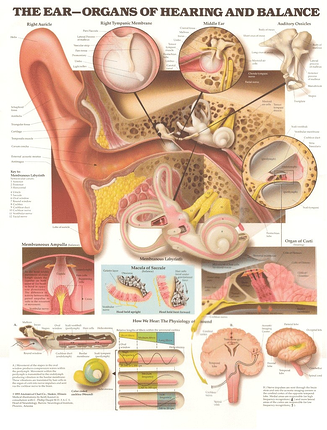 In 1861, French physician Prosper Meniere identified a syndrome that presents as spontaneous vertigo attacks, fluctuating hearing loss, and ringing in the ear. More than 150 years later, the cause is not known, but is associated many times with Migraine headaches and allergies and diagnosis can be difficult. Causes and remedies for the chronic condition have eluded the best of general physicians and scientists. Even ear doctors and audiologists (otolaryngologists) must study a patient's medical history carefully, examine the patient thoroughly, and run specific tests. If they have to work so hard at diagnosis, how can you know if you have Meniere's disease?
In 1861, French physician Prosper Meniere identified a syndrome that presents as spontaneous vertigo attacks, fluctuating hearing loss, and ringing in the ear. More than 150 years later, the cause is not known, but is associated many times with Migraine headaches and allergies and diagnosis can be difficult. Causes and remedies for the chronic condition have eluded the best of general physicians and scientists. Even ear doctors and audiologists (otolaryngologists) must study a patient's medical history carefully, examine the patient thoroughly, and run specific tests. If they have to work so hard at diagnosis, how can you know if you have Meniere's disease?
Related Blog: Treatment for Symptoms of Meniere's Disease
What is Meniere's Disease?
Meniere's is a chronic condition with repeated incidents of spontaneous vertigo, a feeling that the room is spinning with nausea and vomiting. It also manifests itself as fluctuating hearing loss, tinnitus in one or both ears, and a sense of ear pressure or fullness. It appears in people of all ages, but it is rare in children and most often affects people in middle age. Causes are not clear but study of the inner ear shows increased pressure and fluid similar to glaucoma of the eye. Ear doctors can offer various treatment protocols to relieve the symptoms.
Symptoms of Meniere's Disease
Because the incidents are unpredictable, it may be difficult to self-diagnose. But, over time, patients may develop a list of warnings. For example, the feeling of pressure or fullness in one ear may precede an episode; on the other hand, it may not.
- Some loss of hearing that distorts sounds and speech differentiation
- Ringing in the ear
- Feeling that the room is spinning you out of balance
- Nausea, vomiting, and weakness during the episode
The attacks may last from one hour to several, and they may recur with increased frequency and intensity to the point of being disabling. Hearing loss can be permanent due to middle ear damage over time.
Ear Doctors Need to Know
People need to be alert to the complex of symptoms. Even one incident of vertigo should warn of some problem that may or may not be Meniere's disease because vertigo is not a good sign.
Any of the following require a doctor's visit:
- An incident goes on for more than three hours.
- Symptoms are more severe than usual.
- Hearing problem last more than 24 hours.
- You fall or pass out.
- Symptoms to not respond to usual medications.
- There is pressure and fullness in the ear
Such symptoms warrant a visit to a hospital Emergency Ward to rule out other problems. Balance is governed by fluid-filled semicircular canals in the inner ear. Lift or turn the head, and the inner ear fluid moves sending a message to the brain about the body's position. If that fluid pressure increases, it can cause the membranes in the canals to swell and dilate. Some ear doctors believe that, when the membrane ruptures, different inner ear fluids mix to upset fluid balance.
Treatment of Meniere's Disease:
Ear doctors know that individual symptoms may be evidence of some other problem, so they have to rule out those causes. Experienced ear doctors will review your medical history and family medical history at length. (While the cause is not clear, it appears the Meniere's disease runs in families in about 15%.)
The doctor or audiologist will conduct a series of tests:
- Other potentially treatable disease processes and causes for the symptoms, however, must be ruled out.
- Typically, ear doctors will perform a series of basic lab tests, a hearing test, special tests of balance and an MRI (brain scan) to rule out other causes for the symptoms.
Symptom Management:
While there is no known cure for the condition, ear doctors do recommend a regimen that includes:
- Prescription medication that targets symptoms and incidents, including drugs focused on vertigo - Ativan (lorazepam) placed under the tongue, and anti vert or meclyzine taken orally.
- Diet modification starts with low-salt intake. Diuretics such as diamox and dizzied will help reduce the pressure
- Vestibular rehabilitation with a physical therapist will address balance issues
- Relaxation, yoga, and meditation techniques
- Lifestyle changes mean abstinence from alcohol and tobacco, stressful situations, and sudden head movements.
Depending on the severity of the symptoms and the degree of related disability, ear doctors may recommend surgery. Minimally invasive office procedures perfusing the inner ear with steroids or gentamicin
Vestibular neurectomy severs the vestibular nerve while preserving hearing. This procedure was developed by Dr. Silverstein. The results of this procedure are excellent, however minimally invasive procedures have made this surgery infrequently done today
If hearing is poor Removal of the inner ear labyrinth as a last resort will cure the disease.
After surgery hearing in the deaf ear can be obtained by using a cross hearing aid or having a BAHA (bone anchored hearing aid) a minor procedure that transmits sounds to the good ear
Ear doctors using some holistic approaches also report success. They combine nutritional supplements with anti-inflammatory medication and natural nutrients to control the inner ear fluid levels and nourish the depleted membrane cells.
Menier's Disease seems to occur in only one out of 1,000, and its symptoms can resemble other medical conditions. So, it is not unusual for general practitioners to miss the implications. Ear doctors, however, approach things differently and are best positioned to observe, research, and treat the concurrence of symptoms of what can be a very debilitating disease. Qualified ear doctors can help patients find some peace.
Three ear specialists are ready at the Silverstein Institute founded by renowned ear surgeon, clinical research specialist, and Meniere's treatment specialist, Herbert Silverstein, MD. Find a convenient Florida location today.










